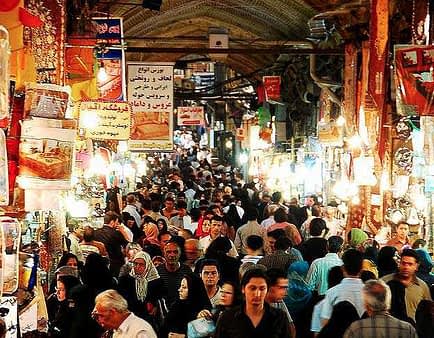Tehran’s Grand Bazaar
Despite high entrance fees and strict bureaucratic regulations, the Hojiblanca group have set about increasing their promotion of olive oil in Iran, a country which is seen to have potential for significant growth in the olive oil market. The group, made up of almost thirty Córdoba based cooperatives has begun a new advertising campaign in Iran, in the hope of increasing and strengthening exports.
Hojiblanca has been exporting to Iran for five years, starting with table olives, and more recently including extra virgin olive oils, with initial predictions of about 250,000 liters per year. Current exports are worth around EUR 1 million ($1.3 million) to the company. However, Iran, a country with a population of 80 million people, consumes about 10,000 tons of olive oil a year, and so is seen as having great potential, despite duty taxes of 90 percent on bulk olive imports, 45 percent for packaged olives and 50 percent for olive oils.
The Hojiblanca promotional campaign is based on a combined approach of olive oil tastings and outdoor advertising, such as billboards. Tastings will be offered at points of sale, giving consumers the opportunity to sample extra virgin olive oils produced by the 26,000 families of olive growers from nine different Spanish provinces that make up the group.
Billboards will also be placed in high visibility areas of major cities including Tehran, Ahvaz, Isfahan and Shiraz, with an emphasis on the taste of extra virgin olive oil, a key selling factor in a market more accustomed to bland oils. A focus on purity and quality is also important as Iran has previously been subject to poor quality imports and impure domestically produced olive oil.
The Hojiblanca group is a world leader in olive oil production, and continues to grow and add more partners to the entity annually. Last year’s harvest saw 246,845 tons of olive oil produced by the company, breaking records from previous seasons. This huge harvest represents about 7.9 percent of the total olive oil production worldwide, with cooperatives in Córdoba, Jaén and Málaga leading the way with around 74,000 tons of olive oil harvested each.
As a cooperative, the Hojiblanca group has grown rapidly since its formation in 2003, when the cooperatives of Cordoliva and Oleica Hojiblanca joined forces, aiming to create greater commercialization of products and increased services to growers. With a turnover of EUR 535.9 million ($703.2 million) last year, of which 389 million corresponded to the cooperative, the Hojiblanca group is the leading producer of olive oils and table olives worldwide.




